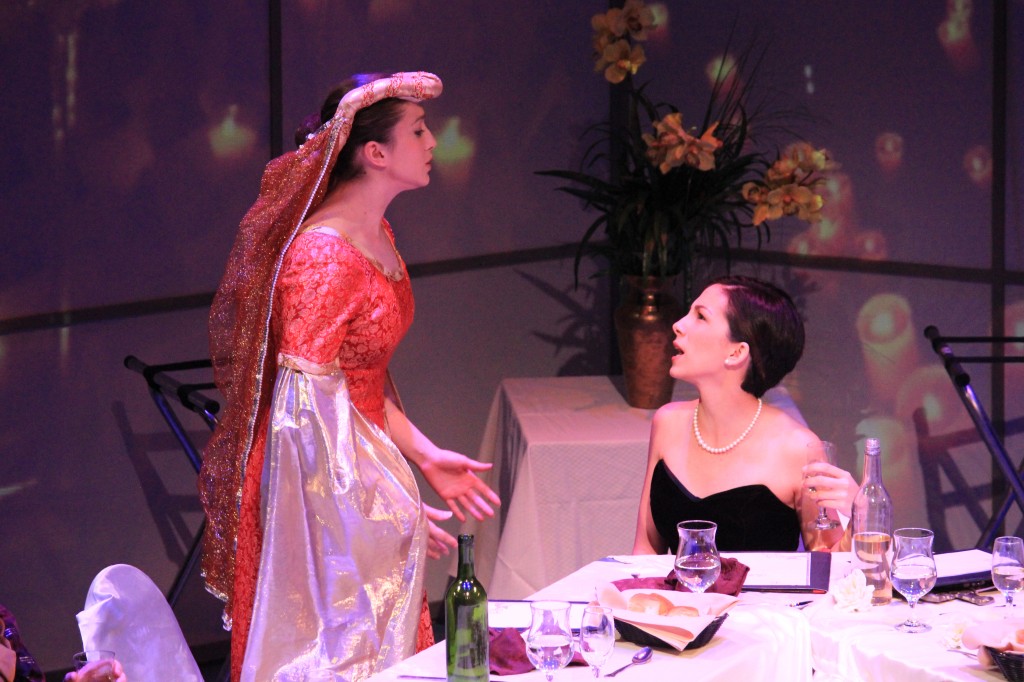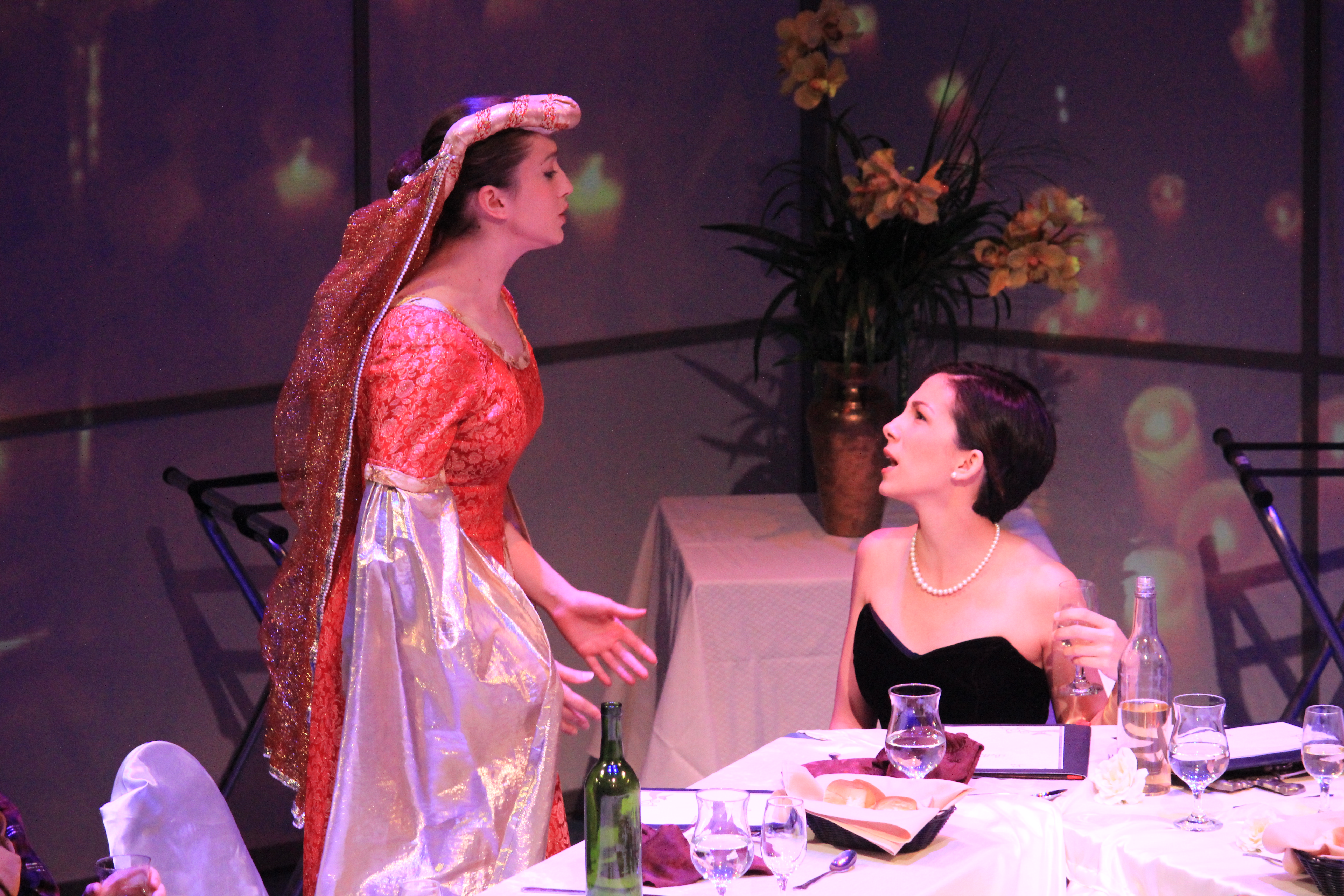

Photo Credit / Dana Reese
BY DANA REESE
EDITOR IN CHIEF
Between April 30 and May 5, the East Stroudsburg University of Pennsylvania Department of Theatre presented “Top Girls,” a play by Caryl Churchill.
The play was directed by East Stroudsburg University’s Stephanie French, Ph.D., who is a professor from the Theater Department.
“Many young women today, with little understanding of the history of women in society, would not identify themselves as feminists—even if they believe in social equality,” wrote Dr. Stephanie French in the Top Girls program.
This play was designed to invite the audience to explore the troubles of women and their roles in society. As Marlene (Felicia Revero) progresses through the play, she confronts stereotypes that many women in the working world have struggled with for decades. Beginning at the dinner scene, reminiscent of Judy Chicago’s Dinner Party, Marlene is surrounded by women from history, fiction and myth.
As the dinner unfolds, each woman lets her tale and opinions fly across the table, as Marlene orders more wine for the guests. Though the dinner is originally planned to celebrate Marlene’s own promotion, the focus differs from guest to guest as each woman explains her own social achievements.
In the presence of Pope Joan (Noami Snyder), Isabella Bird (Rebecca Regina), Lady Nijo (Elldee Gao), Dull Gret (Ellyse Burnett) and Patient Griselda (Michelle Jones), Marlene appears ashamed to admit what she had accomplished in comparison to the women around the table. In fact, when she does tell them the party is to celebrate her promotion, the famous women in the room laugh at her.
“Marlene has thrown the dinner party for herself, and then they laugh at her accomplishment,” Dr. Andrea McClanahan said during Friday’s after-play talk.
Dr. McClanahan talked about the unfair standards that women’s accomplishments are held to, and looked at this scene as one of the most telling from the play, as women compare the apparent values of their societal accomplishments.
As the play continues, Marlene is back into reality in Scene 2 of Act 1, when she finds herself back in the “Top Girls” Employment Agency. From all sides, during the rest of the scenes in the working world, Marlene is faced with opposition and cruel remarks based on her success in being promoted.
For the majority of the first half of the play, the focus is on Marlene’s struggles in the working world. It isn’t until Scene 3 of Act 1 that the role of family begins to show up for Marlene’s character
With Scene 3, the audience is introduced to Marlene’s sister, Joyce (Esther Jospeh) and her daughter, Angie (Ellyse Burnett). Angie is rough and fights openly with her mother, even telling her friend, Kit (Naomi Snyder), that she wanted to kill her mother. Very quickly it becomes clear that Angie idealizes her aunt Marlene, and the 16-year-old girl plans to sneak to London to visit her aunt and try to find a job.
In the first Scene of Act 2, the audience meets different clients of the “Top Girls” Emplyoment Agency, including Louise (Rebecca Regina). Louise, tells the story of her dedicated job at the same establishment for 46 years, and how she has trained men who would soon be promoted over her. Each woman comes in with a story and attitude that introduces different troubles women in the workplace faced in the 1980s, and still face today.
One man’s wife comes on stage, Mrs. Kidd (Esther Joseph), and tries to convince Marlene to refuse the position so that Mr. Kidd can have the promotion. Later, it is announced that Mr. Kidd has had a heart attack from the stress of losing a promotion to a woman competitor.
Scene 4 travels back one year, to Joyce’s kitchen where Marlene, Joyce and Angie are all talking over tea. Over the course of heated discussion, the family history slowly unravels. Joyce and Marlene cannot understand one another, as Joyce chose to stay at home and raise Angie, who the audience soon finds out was actually Marlene’s biological daughter. Over the course of the final discussions, the women fight and bicker over who was right: the woman who married and stayed at home to raise a family, or the woman who chose to leave her family behind—even her baby daughter—and pursue a career?
By the end of the play, the audience is left without an answer, and without any clear path to happiness. All of the characters have lost greatly, and seem to have driven themselves into almost impossibly contrived mazes. Where Marlene has found success in her business world, Joyce accuses her of failure as a mother and a family member. It becomes clear that the world in which these women—those from the dinner scene, those from the employment agency and those from Marlene’s immediate family—are not in a world that favors their overall happiness and success. It is clear that society still does not understand how to accept women, and women themselves do not understand how to accept one another.
By the end of the play, Dr. McClanahan’s words hit the right key.
“It’s all about choice,” said Dr. McClanahan. “I view feminism as equality without judgment.”
After each production of the play, speakers from the ESU community discussed “Exploring the Balance—Women Pursuing Vocations and Avocations and Balancing Life Choices.” Speakers included Dr. Patricia Kennedy, Kelly McKenzie, Dr. Marcia Welsh, Dr. Andrea McClanahan, Maria Picon, and Dr. Erin O’Donnell. Various student speakers attended each session as well.
For the Friday night session, Dr. McClanahan and students from the Feminist Alliance spoke about “Third Wave Feminism: Where are We and Where are We Going?”
“One thing that is important about the play is that we hear too often we don’t need feminism,” said Dr. McClanahan. “It always shocks me how many students, when we talk about the equal rights amendment, they think we passed it.”
The audience of the play was asked to pose questions to the panel relating to feminism, the play, and anything else they might find pertinent. In response to one question, Dr. McClanahan stressed one of her main messages for the night, saying, “Equality benefits everyone.”
Accompanying Dr. McClanahan were students Emily Fox and Aalih Hussein.
“Around Big 10 universities there are 30% less women hired than men, and they’re paid 20% less,” said Fox. “If we don’t keep moving forward it’s very easy to fall back into old behaviors. You’ve got to keep pushing forward.”
Fox also discussed the difficulties women have the science fields when it comes to getting hired.
“When I learned about feminism, I realized how much I really connected to it,” said Hussein. “Feminism to me is a promise to myself.”
Email Dana at:
dmr3179@live.esu.edu

